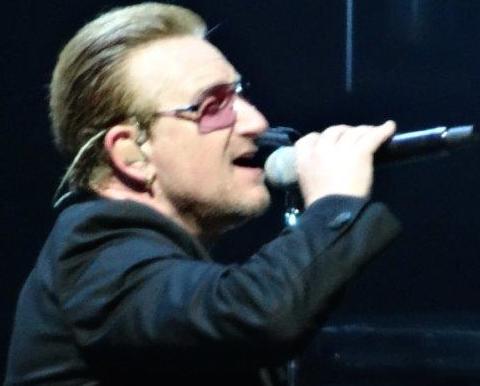The band overcomes any shortcomings and foibles with passion and multimedia flair
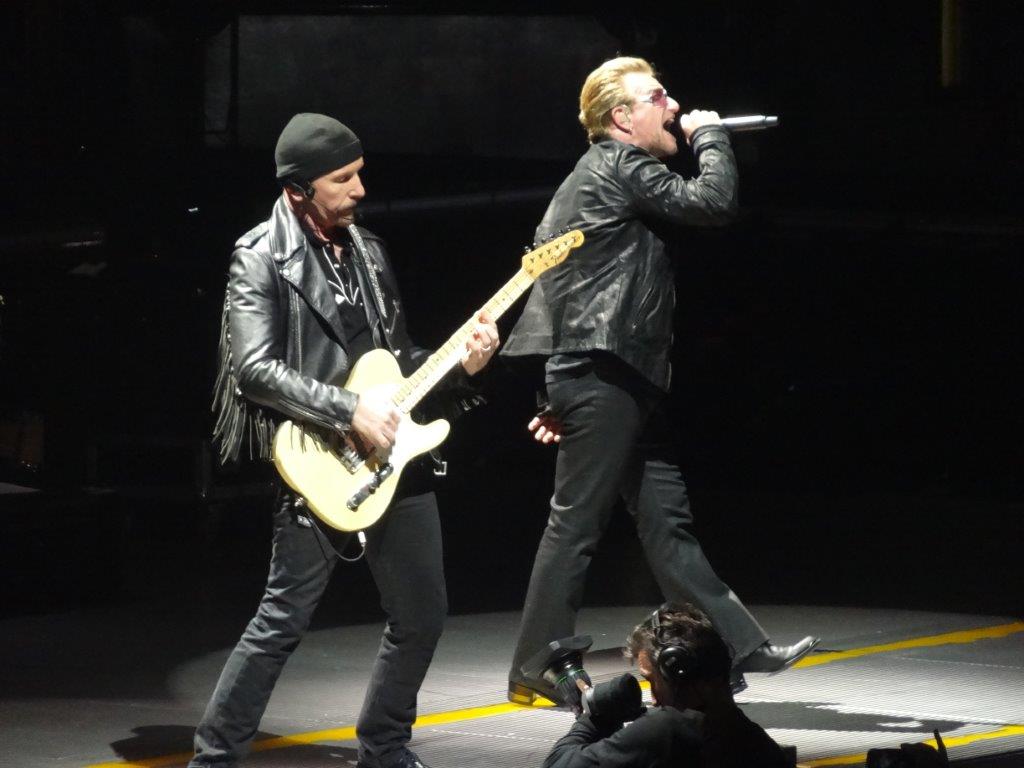
TD Garden, Boston, MA
July 10, 2015
U2 has always been about an explosion of emotion, and the first of four sold-out shows at Boston’s TD Garden on July 10 was no exception. If a building has rafters, Bono will sing to them and bring the crowd along with him and his three bandmates: guitarist The Edge, bassist Adam Clayton and drummer Larry Mullen Jr.
The idea remains that the Dublin-born U2 is very much about “You, too.” It’s a bond that’s been tested over time, certainly – witness the response to the spam-like free Apple download of their latest album, Songs of Innocence, stuffed into everyone’s iTunes box, and Bono’s insistence of using his pop celebrity to dance on the stage of world politics – but in concert, especially, that connection continues to be strong.
And in Boston, yeah, maybe even a little more so. Bono saluted the (very-Irish) American city where U2 broke first. “It’s a lucky man,” Bono said, “who can have more than one hometown,” noting their first appearance at Paradise club in 1980 (they were the opening act for Barooga Bandit; who even remembers them?) and more than 20 other local appearances over the years.
U2 believes in truth in labeling, and this year’s trek through America’s arenas is called the “iNNOCENCE + eXPERIENCE Tour.” That’s a nod to the title of a collection of poems by William Blake, of course. But here the first part references their most recent album, Songs of Innocence, and the second, their extensive catalog, recorded over the past three-plus decades.
Friday night, U2 served up healthy doses of both new and old. Bono – the ringmaster and raconteur/provocateur – was not as cat-like as he’s been before (remember that serious bicycle accident he had in New York last year?), but was still pretty damn athletic and commanding, Springsteen-ian in his theatrical scope that reaches the last rows of the arena.
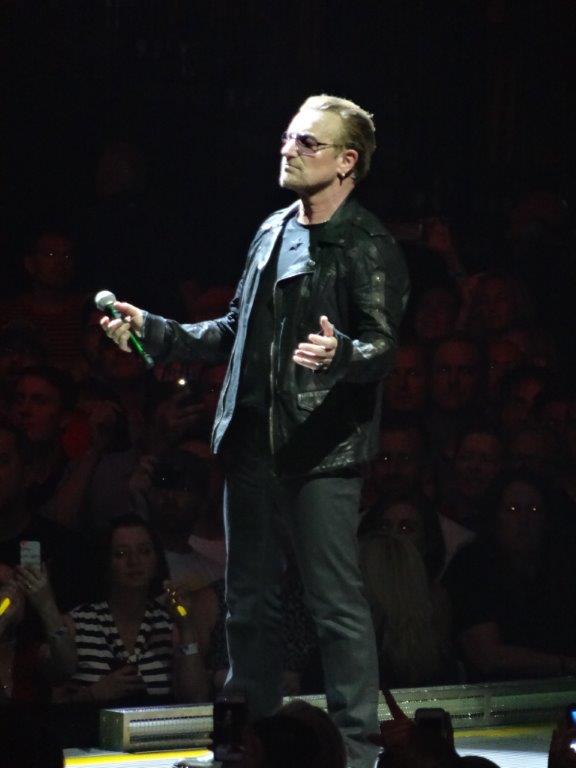
As many arena acts do these days, U2 worked from a main stage and a second smaller stage at the end of the hall, with an extended catwalk connecting them. This was primarily Bono’s territory to prowl, but everyone walked that walk, including Mullen, Jr., playing a snare strapped around his neck for “Sunday Bloody Sunday.” U2 was literally all over the place.
The concert started with “The Miracle (of Joey Ramone),” their bombastic ode to Bono’s punk rock hero. He sang of waking up “at the moment when the miracle occurred, the most beautiful sound I ever heard.” The song is very unlike The Ramones, but very U2-like: Emphatic, over-the-top and arena rocking. We get it: Joey made Bono believe in himself as a singer. Unfortunately, that song was marred by a poor vocal mix that took a few more tunes to get right.
Soon came crowd-pleasing faves from their debut album, Boy: the frenetic “The Electric Co.” (they seem to swap this out with “Out of Control” on other nights) and the anthemic “I Will Follow.” But the two-and-a-half hour show was heavily front-loaded toward material from the new album. While the album is a mixed bag, the live versions packed more punch and took on more power when they were complemented by the projections shown on the high-tech, semi-transparent double scrim that ran nearly the length of the floor above the action. In terms of mixing sound and vision, today’s U2 is right up there with former Pink Floyd leader Roger Waters and his “Wall” tour.
“Raised by Wolves,” about a 1974 terrorist car bombing in Ireland which killed 33 people, was made more striking by the faces of the victims splayed up on the scrim. “Cedarwood Road” about Bono’s (or anyone’s) dreams as a youth, was especially resonant. The animation depicted a young Bono in his bedroom, with Clash and Kraftwerk posters on the wall, a bit aimless, then listening to music on headphones in the living room. There was a second higher catwalk inside the scrim that enabled the live Bono to stride down it and blend in seamlessly with the animation, traffic and houses whizzing past as he trudged ahead into the future.
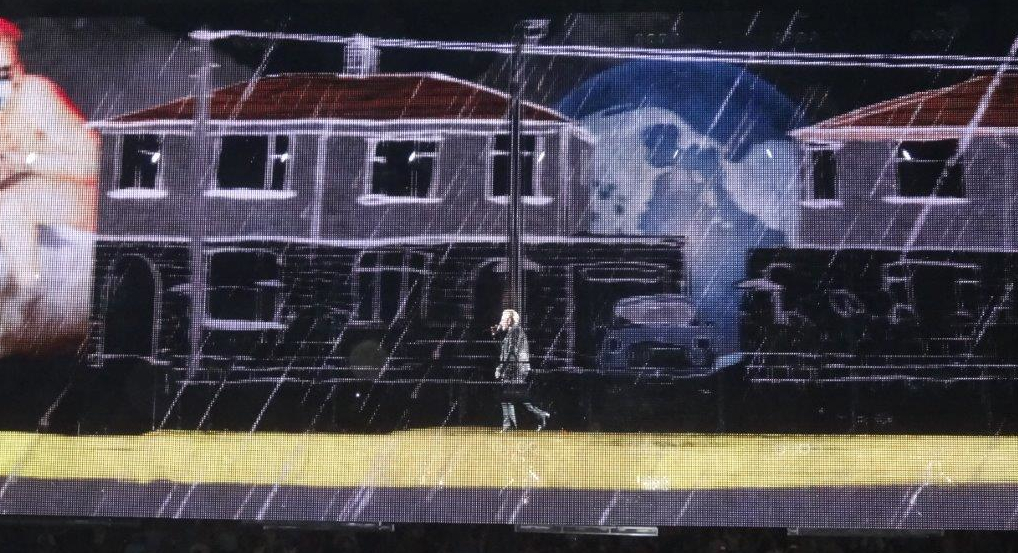
“Iris (Hold Me Close)” was about Bono’s mother, who died when he was 14; images of his parents’ wedding and a young black-and-white Bono running flashed above as he sang “Free yourself… be yourself.” The rock purist in me debates whether these songs would have had the same kick had they just been songs and not multimedia productions, and I suspect they wouldn’t. The fan in me says, “So what?” It enhances the experience and gives the songs a needed visual splendor.
U2 teetered on the verge of sensory overload – hey, at our age, we don’t have the ADD/taking-it-all-in-at-the-speed-of-light reflexes as a Miley Cyrus fan does – but they’ve become very good at this music/multimedia mix.
Amusing backstory: I wrote a positive review 22 years ago for the Boston Globe of a stadium stop on their “Zoo TV” tour, a tour that was mostly getting slammed by critics miffed by the showbiz and visuals, and missing the 100 percent heart-on-the-sleeve emotional blast of the past. I dug some of the humor and irony. Bono sent me a letter a few days later: “Thanks for your kind words… I thought I’d write a note to assure you that the review has gone straight to our heads and we are discussing breaking up the band!! Could this be a FRONTLASH??”
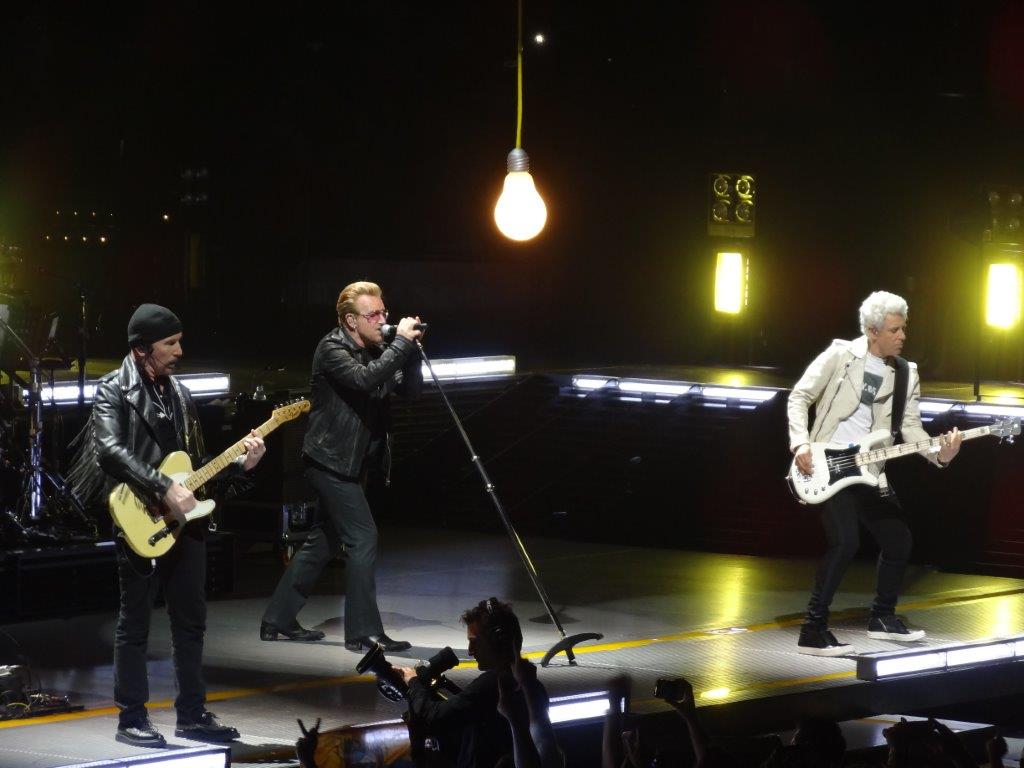
As with any band with a history as long as U2’s – at this point almost like the Stones and The Who – fans could both delight in and quibble with the selections from the catalog. To wit: We got a reworked, rhythmically grinding “Mysterious Ways” and the ever-wrenching “Bad,” but not “I Still Haven’t Found What I’m Looking For” and “Desire.” And still there was an accelerated final quarter, which included “Bullet the Blue Sky,” “With or Without You,” “Where the Streets Have No Name” and “One.”
Don’t miss a post! Sign up for Best Classic Bands‘ Newsletter; form is on every page.
Bono was – no surprise to anyone – both inspiring and tiring. Sometimes simultaneously. “I’m an American,” he said before “Pride (In the Name of Love).” “America is not a country; it’s an ideal, still being born, still being shaped.” Uh-oh, he’s starting to preach to us… but then the song kicked in, with Bono and the band emphatically suggesting that Dr. Martin Luther King’s spirit could not be killed by his assassination. Not surprisingly, Bono wove in mentions of Baltimore, Ferguson and Charleston, and the call of “Sing this for the survivors of April 15th,” referencing the Boston Marathon bombing.
The man does rattle (and hum) on. He plugged raising money to fight HIV/AIDS via his charity called (RED) before singing Paul Simon’s “Mother and Child Reunion.” (Outside the venue, several cheeky protesters were protesting Bono’s idea that circumcision was a valid method of AIDS prevention in Africa. I presume the activists were members of the group following U2’s North American tour, calling itself the “FORESKIN + EXPERIENCE Protest Tour.”)
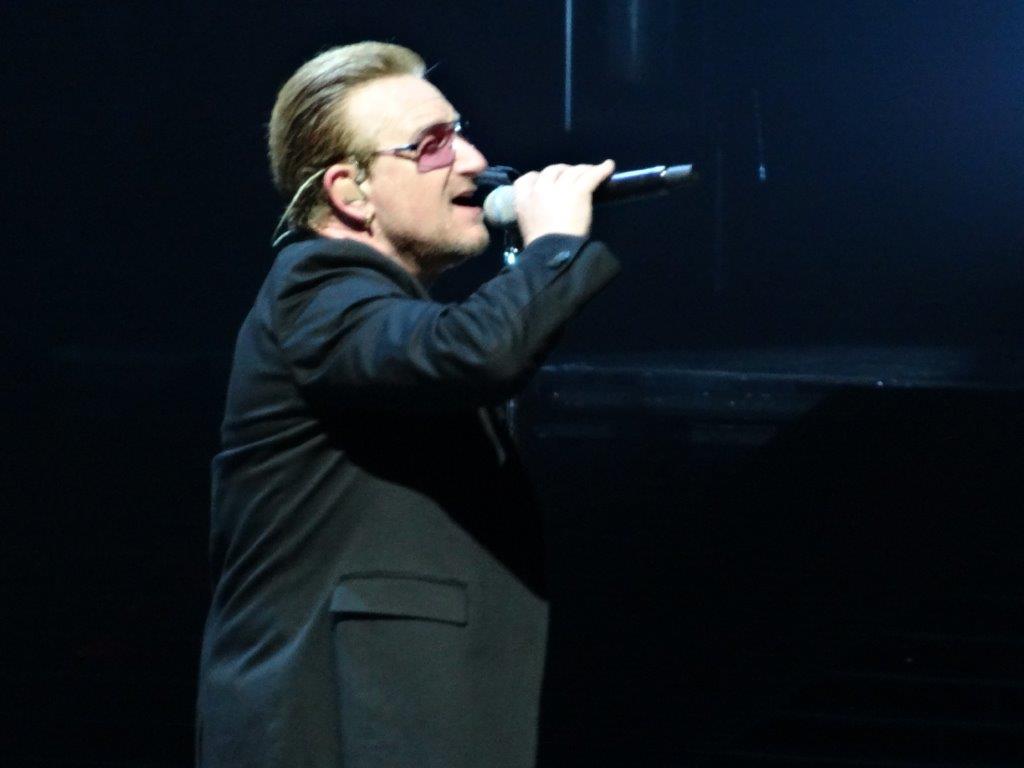
Bono also thanked Patriots quarterback Tom Brady. Aside from an easy applause-getter in Boston, I’m not sure what the celebrity QB did to merit such thanks – might just be the “we’re-all-superstars” thing or maybe he’s doing charitable work Bono approves of. He also thanked various corporate sponsors, including Apple. The latter, especially, was met with (a polite?) silence.
There are times where you can’t help but think Bono is beating you over the head with righteousness. He’s rock’s Luke Skywalker, its Gandhi, its Jesus. (The Bono-thinks-he’s-Jesus jokes have been flying for three decades, mind you.) And there are some chinks in the armor. These guys are amazingly rich rock stars, and despite all his talk about Irish pride, there’s U2’s 2006 tax dodge decision to offshore a chunk of its income through the Netherlands.
But that fades to the background when the music takes over, and U2’s music has that kind of tidal force. Remember that “You, too” comment at the beginning of this review? The final song was “’40’,” U2’s musical version of the Bible’s Psalm 40, with its “How long, how long, how long, how long to sing this song?” outro. The band walked down the catwalk, exiting under the small stage. The crowd picked up the vocal and sang as one, and continued to do so well after the band had vanished from sight. And then on the way out of the Garden. And then into streets.
- Tommy James Interview: The Music, Mob & ‘Mony Mony’ - 04/29/2024
- J. Geils Talks About His Former Band: Last Interview - 04/11/2024
- 10 Unusual and Surprising Cover Songs - 03/30/2024

